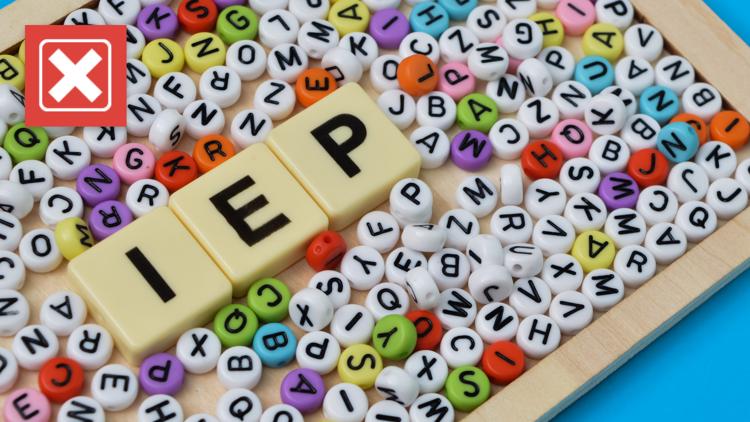Project 2025, an initiative launched by conservative think tank The Heritage Foundation, provides a roadmap for the next conservative president to transform the government.
The VERIFY team has received dozens of questions from readers about what Project 2025 would do if the plan is implemented by the next president.
Charles and Shirley emailed and several others texted us asking if Project 2025 would eliminate individualized education plans or IEPs.
IEPs are custom educational plans that address the learning needs and goals of students with disabilities. States are required to provide those students with any special services that are outlined in their IEPs. Most of this funding is used to support students with learning disabilities and speech impairments.
THE QUESTION
Does Project 2025 call for eliminating IEPs?
THE SOURCES
- Noah Weinrich, director of media and public relations with The Heritage Foundation
- “Mandate for Leadership: The Conservative Promise,” published by The Heritage Foundation, the conservative think tank behind Project 2025
- Individuals with Disabilities Education Act (IDEA)
- Congressional Research Service
- American Speech-Language-Hearing Association (ASHA)
- Eric Buehlmann, deputy executive director for public policy with the National Disability Rights Network
- Denise Marshall, CEO of The Council of Parent Attorneys and Advocates, Inc.
THE ANSWER
No, Project 2025 doesn’t call for eliminating IEPs. But it would change how federal funds for IEPs are distributed and allow different uses for that money.
WHAT WE FOUND
Neither Project 2025 nor The Heritage Foundation have called specifically for IEPs to be eliminated. Project 2025 would, however, change how federal funds for IEPs are distributed and allow parents to put that money into savings accounts or use it for private schools.
A spokesperson for The Heritage Foundation said Project 2025 wouldn’t change the existing IEP process in public schools. But some advocates for people with disabilities say the proposed changes could lead to negative consequences, such as a lack of legal protections for families if their federal rights to an equal education are violated.
IEPs aren’t mentioned anywhere in "Mandate for Leadership: A Conservative Promise," which outlines the plan for Project 2025. Noah Weinrich, director of media and public relations with The Heritage Foundation, also told VERIFY, “At no time has Project 2025 advocated for the elimination of individual education plans.”
Under the Individuals with Disabilities Education Act (IDEA), public schools that receive federal funding are required to create IEPs for eligible students that outline services they will receive. Private schools, however, are not required to provide IEPs or guaranteed special education services because they do not receive federal funding.
RELATED: What we can VERIFY about Project 2025’s plans for the Head Start program and free school lunches
Project 2025 would change IEP funds to a lump-sum model that could be used outside public schools
IDEA funding is currently distributed through the Department of Education’s Office of Special Education and Rehabilitative Services (OSERS). Project 2025 wouldn’t eliminate IDEA funding or IEPs, but it would change how the money is distributed and allow it to be used outside the public school system.
Project 2025 recommends IDEA funding be converted into a “no-strings formula block grant targeted at students with disabilities” distributed by Health and Human Services’ Administration for Community Living rather than the Department of Education. Project 2025 proposes eliminating the Department of Education altogether.
Block grants are fixed amounts of money the federal government gives to state and local governments. These block grants give “broad flexibility” to design and implement programs, and are not subject to as much federal oversight or as many federal requirements, the Urban Institute explained in a 2004 report.
Currently, when states accept federal IDEA funding, they agree to provide specially designed instruction that meets the needs of every eligible child with disability, according to the Congressional Research Service.
“[Under Project 2025, the IEP funds] would be block granted to states, which could then be converted into education savings accounts instead, if a parent wanted it. Parents who like the existing IEP process and want to stay in their public schools could still do that. This doesn't touch that process at all,” Heritage Foundation spokesperson Weinrich told VERIFY.
“For those parents for whom that arrangement isn't working, they could take their share of IDEA funding to a private school instead. So the only change is that we provide more flexibility to parents if they want to use their IDEA funds at a school that's not their assigned public school. The amount of funding doesn't change, just who is directing the funding,” Weinrich said.
RELATED: Yes, Project 2025 recommends requiring military entrance exams for public high school students
Critics say the proposal could erode accountability in meeting students’ needs
It’s not currently known how Project 2025’s distribution structure would impact the existing IEP programs because the proposal hasn't been implemented. But some disability advocates say the proposed structure could have negative consequences for students with disabilities.
Eric Buehlmann, deputy executive director for public policy with the National Disability Rights network, outlined a handful of potential issues with The Heritage Foundation’s description of what Project 2025 could mean for students with disabilities.
Buehlmann expressed concerns about how the funding would be distributed under a block grant model. He told VERIFY it would be impossible to come up with a formula that would divide funds fairly based on students’ ever-changing needs.
He said it’s also unclear whether the IDEA mandates for equal services would still apply to private schools. That means parents and students may not have recourse if their rights under federal law are violated, a concern that Denise Marshall, CEO of The Council of Parent Attorneys and Advocates, Inc., shares.
“While many families want to have control of the funds, as some states have done in the form of vouchers or savings accounts, disrupting the funding stream by giving funds to parents often means giving up student and parent rights and anti-discrimination protections under federal law. That can be harmful in some situations, leaving families without recourse,” Marshall said.
Buehlmann said the potential transfer of IDEA oversight from the Department of Education to HHS also poses concerns because programs for students with disabilities would be separate from other education services.
“One of the benefits of having oversight at the Department of Education is that it allows the integration of the views and needs of students with disabilities with students without disabilities because the Department of Education oversees programming for both groups of students,” he said. “Transferring just the programs that consider students with disabilities to the Administration on Community Living means a loss of knowledge and expertise on ways to fully integrate both sets of students.”
Do you have a question about the proposals in Project 2025? Email us at questions@verifythis.com or send a text to 202-410-8808.



